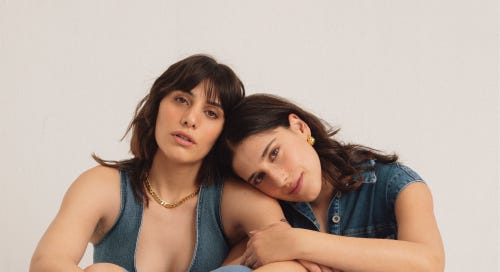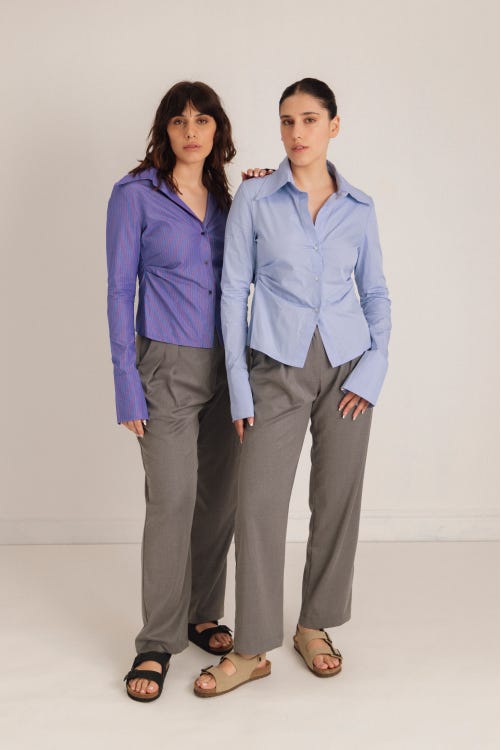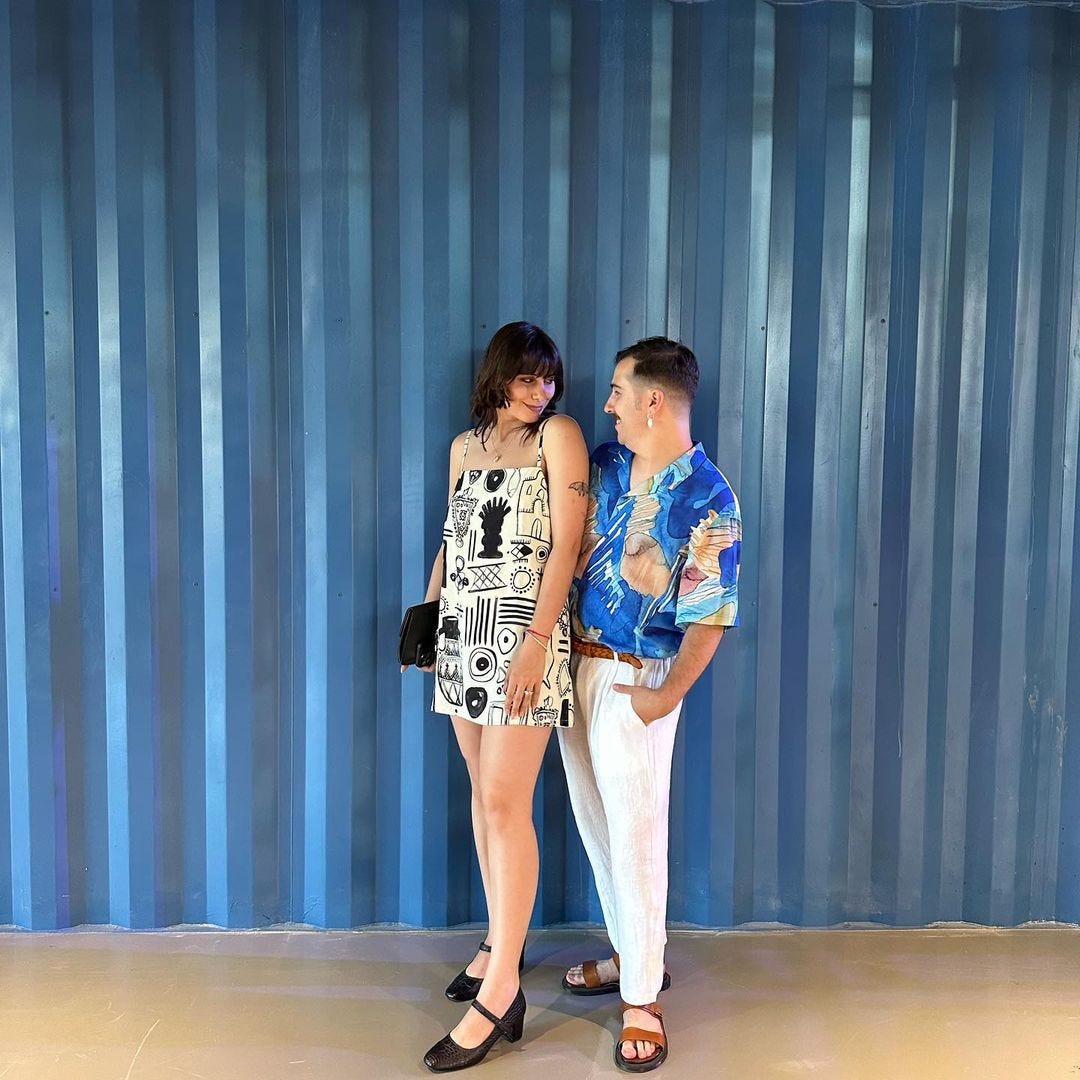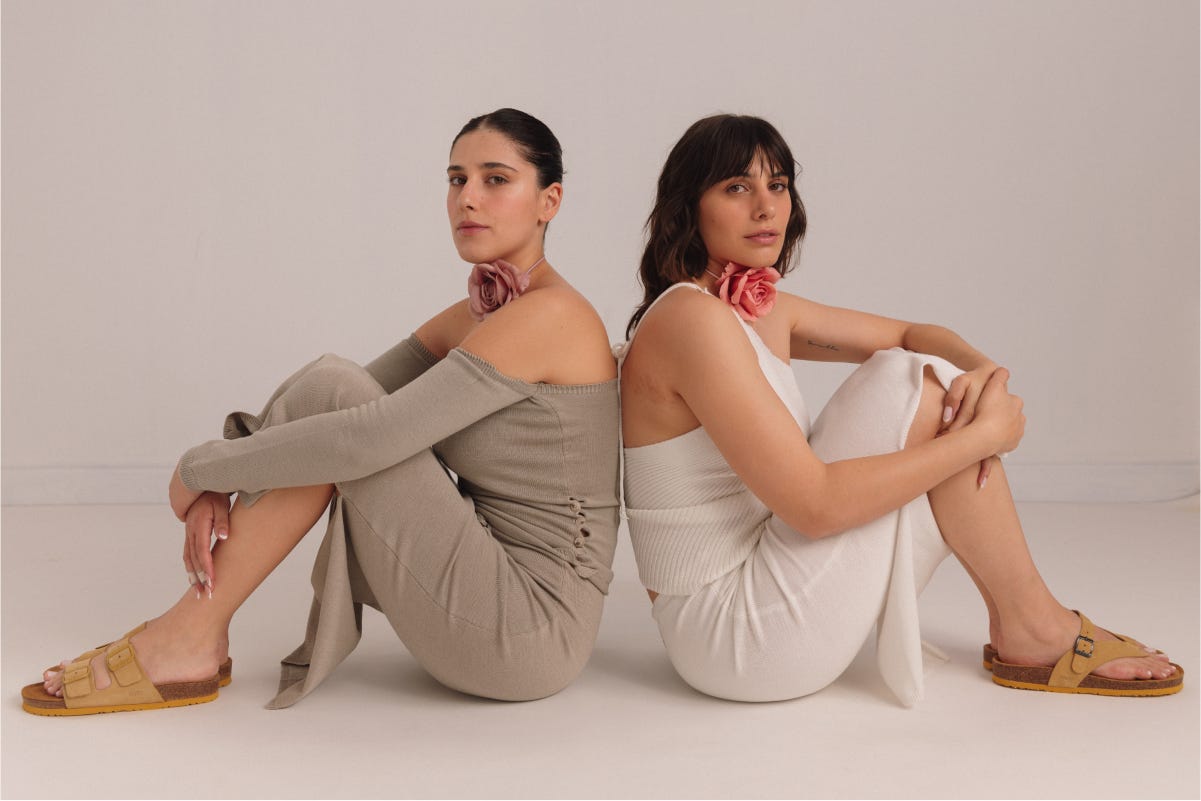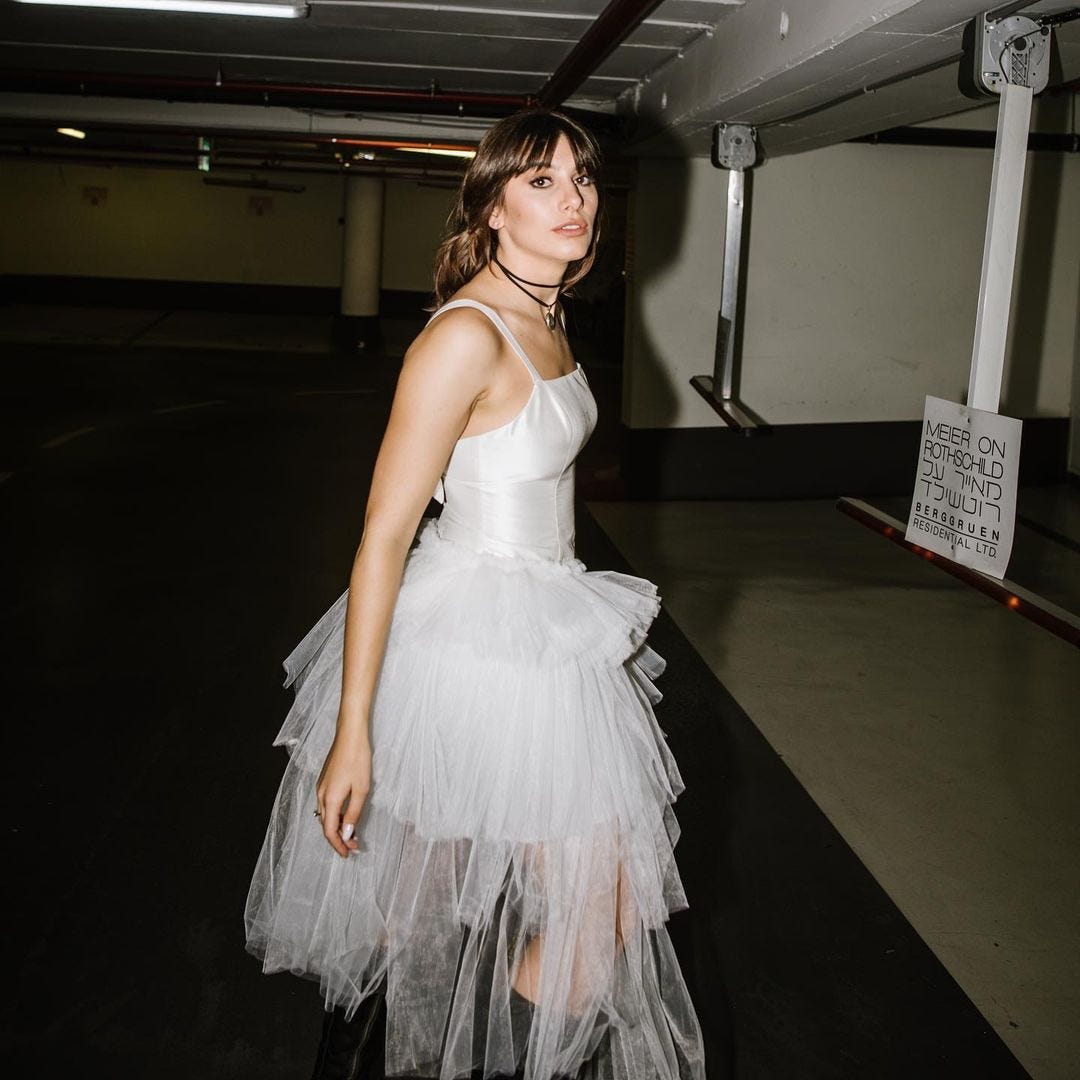“It's time to keep the money in Israel”
Amit and Reut Zantkern, founders of Israeli online magazine ARE, talk about local designers and the challenges of the Israeli fashion world
I discovered the ARE digital magazine soon after I began exploring Israeli designers: many of them followed ARE on Instagram and referenced the articles covering young brands and sustainability issues. ARE magazine was founded by two sisters, Amit (27) and Reut (26) Zantkern in 2018, who aim to create a space for young people to learn more about the fashion industry, promote local designers, and build a creative community of like-minded individuals.
Now, a month after the October 7 attack on Israel, the Zantkern sisters have created a directory of Israeli designers on the magazine’s website. Here, visitors can discover and explore Israeli designers and support them in various ways—by following, sharing, or purchasing. According to the magazine's statement, "If today we do not buy products made in Israel, Israeli fashion, and design, we will not sustain the food culture and local businesses. At the end of the war campaign, we may find that the industry we collectively built has been destroyed. It's time to keep the money in Israel."
There were ongoing air raids in Tel Aviv, so we spoke with Amit and Reut via Zoom.
Amit – Sorry for the way I look. I tried to dress up today, but I wasn't in the mood. So I decided a PJ would be nice and comfy.
How are you guys? Are you in Tel Aviv?
Amit and Reut – We're in Ramat Hasharon, which is close.
Is it more or less quiet?
A and R – Yeah, you can say that. Maybe two alarms a day.
I’m going to start with questions about the magazine.
R – I'll step aside because Amit is more articulate.
A – And she's for the show.
R – I’m here just for the beauty.
A – But we always work together. We started our magazine five years ago. We grew up surrounded by Israeli fashion. Our grandmother (Rachel Louk) worked in the textile industry in the 60s and 70s, and our mom (Iris Louk) was a model. She was Miss Israel and then represented Israel in the Miss Universe contest, where she placed third, earning the title of Miss Asia. She's so nice and pretty, it's annoying!
We grew up listening to all of their stories—about who they used to work with, the factories, the stores, and the designers. As we grew up, we assumed that everyone knew how remarkable Israeli fashion was, how great the industry was, how many designers we have. However, it was when our friends started asking for guidance on where to go and what to buy that we began to realize how most young people lack the information we possess. It inspired us to share our knowledge and create a platform for young people to learn about the local fashion community.
Our venture actually began when we were both in the army. I worked as a graphic designer, while Reut was an animator for the Israeli Air Force. Our military duties weren't overly demanding, allowing us plenty of free time. Reut often recounts how I always dreamed of starting a fashion magazine ever since I was 15. I was particularly fond of Leandra Medine. Are you familiar with her? Oh, she was my thing.
In 2014, when blogs were popular, we started a blog, following the trend. Eventually, we transitioned to a magazine when we realized we know a bunch of great people and want their opinions. We aim to share more information and expand our scope, focusing not only on showcasing stylish outfits, but also discussing the industry as a whole.
Now, we have an amazing team of seven writers, each bringing their unique opinions and perspectives on the fashion world, pop culture, and sustainability. Our primary goal is to encourage everyone to share their thoughts and foster the growth of this new community, a community we thought was lacking when we were growing up.
Are there any other fashion magazines here in Israel?
A – We noticed that all the magazines we come across in Israel are more focused on women’s content rather than being fashion magazines per se. We identified this gap after realizing that there hasn’t been an actual fashion magazine that talks about the industry, for the industry. And this is what we are trying to do.
Every fashion magazine mostly focuses on celebrities and shopping. For shopping, it’s mostly major companies like Zara or H&M and luxury brands. However, this is not the fashion content that we cover.
How many readers do you have?
A – This month, we witnessed a significant increase in readership—more than 120,000 page views. During times of conflict, people tend to read more. We're delighted because the content they engage with is about the things we genuinely love and are passionate about.
Can independent media survive commercially in Israel?
A – The short, honest answer is no. We faced a substantial learning curve because we initially assumed that, considering the number of magazines in Israel, selling another one wouldn't be as challenging. However, we soon realized that we were encouraging people to consume something they had never experienced before. We do a lot of things we are passionate about, including our podcast and photo shoots with major brands. Our niche in Israel is quite specific due to the relatively small population. We specifically focus on high fashion, designers, sustainability, and local shopping—making the audience even more limited. Additionally, we have firm values, two major ones being sustainability and supporting local businesses. Therefore, when it comes to advertising, we stick to our values. We don't do Zara. We had numerous opportunities to collaborate with big brands, but we don't believe in them. So we kind of said, f*** the money.
Your magazine is in Hebrew. Do you have non-Hebrew speaking readers?
A – We grew up learning a lot about the fashion world because we knew English very well, which allowed us to read everything we wanted. However, this isn't the case for most people in Israel. When faced with the choice between English and Hebrew, we opted for Hebrew. Our aim was to make our content easily shareable and accessible to every child in Israel who wants to learn about the fashion industry, at no additional cost.
We integrated a plugin into our website that can translate articles into English and Russian (You can find the Translate button at the bottom of the page. — J.V.). We've noticed a growing interest in reading about our fashion industry among people who don't speak Hebrew. Truth be told, before the war, this wasn't something we had considered.
Can you tell me a little bit more about the Israel fashion landscape? Who are the big players? Who are the small players?
A – There are numerous young designers, but not many prominent big brands. Most of the significantly large and established designers no longer work actively; they've either retired or closed their brands. Names like Ronen Chen , Dorin Frankfurt, and ATA are among the relatively larger ones—and that's about it.
R – There are numerous fashion brands by small designers, but they don't tend to survive.
A – It's been five years, and we've compiled lists of brands that were functioning five years ago, but within a year or two, they either ceased operations or shifted to something else. The life cycle of a fashion brand in Israel is relatively short—around one to five years. If a brand manages to extend beyond that, it might survive up to 10 or 12 years. However, they generally remain confined to a single-store system. Everyone has their one main store, and that's it. If you go bigger, most of the time you fall hard. That's the harsh reality.
Israeli consumers prefer buying items cheap. This pattern applies not only to the fashion industry but to all small businesses in Israel. Running a small business in Israel is expensive. Many designers aim to create something unique and distinctive, but producing such items in Israel incurs high costs. And the Israeli consumer doesn’t want to pay for that.
R – There's a lack of fashion culture.
Does the state in any way help the fashion industry?
A – No. A very hard no. In Israel, if it's not a necessity, you don't receive financial support. Fashion certainly isn't considered a necessity by anyone. Technically, you can survive with just one T-shirt. So the state doesn't prioritize supporting the fashion industry. However, there are programs initiated by large brands or individuals with financial resources aimed at sustaining the fashion industry. They conduct contests and similar initiatives to aid the growth of small brands.
And there are institutions like Shenkar that produce fashion designers for the global stage.
A – Many of these designers leave Israel to work in Europe. There are not enough clients here, and there are no major fashion houses to gain experience from or enhance their résumés. I estimate the audience for the fashion industry in Israel to be no more than 50,000 people. That's a small community, and constantly selling to the same audience becomes challenging because they seek something new and different.
R – The most successful designers in Israel are those who specialize in bridal wear because almost everyone gets married, and wedding dresses can't be easily bought online. Women are willing to spend thousands of shekels on a dress, so the bridal industry in Israel thrives.
A – Essentially, you have two distinct industries: bridal and fashion. Bridal wear is very successful, while the fashion industry, comparatively, is not as thriving.
Why do you divide bridal from fashion? Bridal is also fashion.
A – Because it's not recurring. You buy one dress. You don't typically go and buy multiple wedding dresses. When I got married, I went to Shahar Avnet; she made my wedding dress, and it was amazing. But that's it, that's my wedding dress. I wouldn't go and get another one—for now.
R – Unless you get married like five times, which is fine!
A – Absolutely fine! (Laughs)
Can you speak about what's happening now? Is there a place for fashion right now, with the war still going on?
A – Every time we go through this cycle of war, it's the same. People close their stores; they can only sell online. Most people save their money because they're unsure of what's going to happen. Purchasing expensive clothes becomes less of a priority. Consequently, especially at the moment, most designers see zero revenue.
R – But in a week or two, we're going to bounce back. It's not the end of the world. It's not that we want to spend a lot of money on clothes right now, but we're not completely restrained.
A – Currently, as a magazine, we're putting the spotlight on designers who need it. This is the time to call upon the industry and everyone outside it to come and support us. Recognize the talent we have, the number of people, shops, and brands. This is the time to acquaint yourself with them.
We're working on a categorized directory of designers within our website, for readers who want to buy something for themselves and aren't familiar with Israeli designers. They can visit the list, explore new names, and decide whom they want to support or follow—just to spread the word.
It took us a lot of time. We've intended to do this for a few years, but things change so rapidly here. It's so dynamic that we were unsure how to proceed. Then last week, we decided—if not now, then when?
What a great idea!
R – We're aiming to spread the word not only in Israel but worldwide, encouraging support for Israeli brands.
Five short questions for Amit and Reut:
Where to eat in Tel Aviv?
Amit – Mententen. I got married there!
What’s your favorite secret spot in Tel Aviv?
We hate Tel Aviv! (Laughing) This is the worst city ever!
But we do like the House of Coffee on Tavor street. It’s so beautiful, we love it.
Favorite month of the year?
Amit – It's so hot here. So I love winter. December, like in Taylor Swift's song. I got married in December too. It's my month.
The best anti-stress practice?
Reut – I'm hooked on Instagram reels where people clean or cook.
Amit – I go to the gym.
Any advice that you would give to yourself two years ago?
Amit – Don't give up.
Reut – I would say that everything will be fine. Trust yourself.

